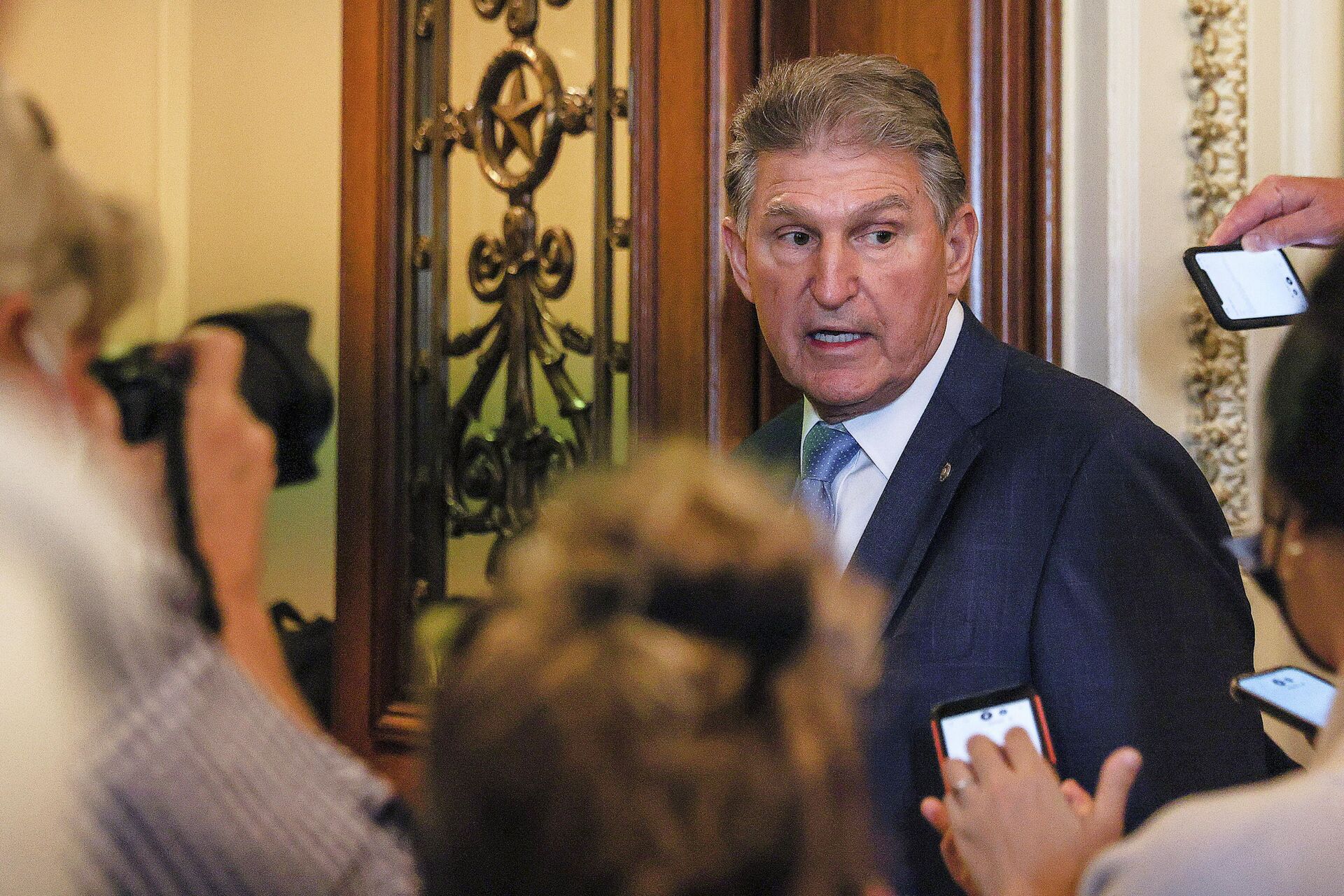https://sputnikglobe.com/20211017/two-moderate-democrats-opposing-bidens-35-trln-bill-rake-in-record-sums-in-third-quarter-1089981517.html
Two Moderate Democrats Opposing Biden's $3.5 Trln Bill Rake in Record Sums in Third Quarter
Two Moderate Democrats Opposing Biden's $3.5 Trln Bill Rake in Record Sums in Third Quarter
Sputnik International
Senator Joe Manchin (D-WV) has repeatedly criticised President Joe Biden's $3.5 trillion reconciliation plan, making it clear that he will not support anything... 17.10.2021, Sputnik International
2021-10-17T08:30+0000
2021-10-17T08:30+0000
2022-12-19T13:59+0000
joe biden
senate
sen. joe manchin (d-west virginia)
infrastructure bill
reconciliation
us
democrats
https://cdn1.img.sputnikglobe.com/img/107034/46/1070344646_0:100:1921:1180_1920x0_80_0_0_07604d3a5ec3a143f410b64d56fe4c52.jpg
Democratic Senators Joe Manchin and Kyrsten Sinema, the two main opponents of the president's $3.5 trillion "Build Back Better" bill, raised record funds in the third quarter of 2021, new Federal Election Commission filings have revealed.According to the filings, the two moderate Democrats managed to raise more money in the three months to the end of September than they did in any other quarter in a non-election year.Manchin and Sinema, who represent West Virginia and Arizona, respectively, are not up for re-election until 2024.The filings showed the West Virginia Democrat bagging almost $1.6 million in the third quarter, versus $1.5 million in the second quarter, and over $175,000 in the first.Sinema, in turn, raised more than $1.1 million in the third quarter, which narrowly outpaced her haul in the second. In the first quarter, the Arizona senator raked in over $375,000.Additionally, the filings showed that the two received hefty contributions from the oil and gas sector, as well as the pharmaceutical and financial services industries. For example, Manchin's biggest donors in the third quarter included the major oil firm Occidental Petroleum and Aethon Energy, another big oil and gas player.The Federal Election Commission documents come as the pair remain under fire from progressive Democrats, who accuse Manchin and Sinema of sticking to special interests, including the fossil fuel and pharmaceutical industries, amid the two's ongoing criticism of President Joe Biden's reconciliation plan, which Manchin claims is too hefty.On Saturday, Biden admitted that despite earlier pledging to get the document through, the bill's $3.5 billion price tag would have to be scaled back. Progressive and moderate Democrats are still at odds over the bill, which focuses on providing funding for education, healthcare, and the environment that would be accumulated though corporate and personal tax increases.The remarks came after Manchin said in August that he was seriously concerned about "the grave consequences facing West Virginians and every American family if Congress decides to spend another $3.5 trillion".He also underscored that he won't support anything in excess of $1.5 trillion, while Sinema recently said that she would not vote for the reconciliation package before Congress approves a separate $1 trillion infrastructure bill.Aside from stipulating hefty spending on roads and bridges, the bill, which was approved in the Senate but is stalled in the House, contains contentious proposals to fund things like environmental efficiency improvements and other non-public infrastructure outlays.Republicans have repeatedly described the bill as wasteful, arguing that the document has little to do with infrastructure and instead embraces political pet projects.
Sputnik International
feedback@sputniknews.com
+74956456601
MIA „Rossiya Segodnya“
2021
Oleg Burunov
https://cdn1.img.sputnikglobe.com/img/07e4/09/0b/1080424846_0:0:2048:2048_100x100_80_0_0_3d7b461f8a98586fa3fe739930816aea.jpg
Oleg Burunov
https://cdn1.img.sputnikglobe.com/img/07e4/09/0b/1080424846_0:0:2048:2048_100x100_80_0_0_3d7b461f8a98586fa3fe739930816aea.jpg
News
en_EN
Sputnik International
feedback@sputniknews.com
+74956456601
MIA „Rossiya Segodnya“
Sputnik International
feedback@sputniknews.com
+74956456601
MIA „Rossiya Segodnya“
Oleg Burunov
https://cdn1.img.sputnikglobe.com/img/07e4/09/0b/1080424846_0:0:2048:2048_100x100_80_0_0_3d7b461f8a98586fa3fe739930816aea.jpg
joe biden, senate, sen. joe manchin (d-west virginia), infrastructure bill, reconciliation, us, democrats
joe biden, senate, sen. joe manchin (d-west virginia), infrastructure bill, reconciliation, us, democrats
Two Moderate Democrats Opposing Biden's $3.5 Trln Bill Rake in Record Sums in Third Quarter
08:30 GMT 17.10.2021 (Updated: 13:59 GMT 19.12.2022) Senator Joe Manchin (D-WV) has repeatedly criticised President Joe Biden's $3.5 trillion reconciliation plan, making it clear that he will not support anything exceeding a $1.5 trillion price tag.
Democratic Senators Joe Manchin and Kyrsten Sinema, the two main opponents of the
president's $3.5 trillion "Build Back Better" bill, raised record funds in the third quarter of 2021, new Federal Election Commission filings have revealed.
According to the filings, the two moderate Democrats managed to raise more money in the three months to the end of September than they did in any other quarter in a non-election year.
Manchin and Sinema, who represent West Virginia and Arizona, respectively, are not up for re-election until 2024.
The filings showed the West Virginia Democrat bagging almost $1.6 million in the third quarter, versus $1.5 million in the second quarter, and over $175,000 in the first.
Sinema, in turn, raised more than $1.1 million in the third quarter, which narrowly outpaced her haul in the second. In the first quarter, the Arizona senator raked in over $375,000.
The Financial Times noted that Manchin "ended the quarter with $5.4 million cash on hand, while Sinema had $4.5 million in the bank — relatively large sums of money for politicians who will not need to face voters for another three years".
Additionally, the filings showed that the two received hefty contributions from the oil and gas sector, as well as the pharmaceutical and financial services industries. For example, Manchin's biggest donors in the third quarter included the major oil firm Occidental Petroleum and Aethon Energy, another big oil and gas player.
The Federal Election Commission documents come as the pair remain under fire from progressive Democrats, who accuse Manchin and Sinema of sticking to special interests, including the fossil fuel and pharmaceutical industries, amid the two's ongoing criticism of President Joe Biden's reconciliation plan, which Manchin claims is too hefty.
On Saturday, Biden admitted that despite earlier pledging to get the document through, the bill's $3.5 billion price tag would have to be scaled back. Progressive and moderate Democrats are still at odds over the bill, which focuses on providing funding for education, healthcare, and the environment that would be accumulated though corporate and personal tax increases.
"When I hear people say it costs $3.5 trillion, I'll be honest with you, we're probably not going to get $3.5 trillion this year. We're gonna get something less than that, but I'm going to negotiate. I'm going to get it done", POTUS said.
The remarks came after Manchin said in August that he was seriously concerned about "the grave consequences facing West Virginians and every American family if Congress decides to spend another $3.5 trillion".
"Over the past year, Congress has injected more than $5 trillion of stimulus into the American economy - more than any time since World War II - to respond to the [COVID-19] pandemic", the senator said, making it clear that he was not going "to support a bill that costs $3.5 trillion".
He also underscored that he won't support anything in excess of $1.5 trillion, while Sinema recently said that she would not vote for the reconciliation package before Congress approves a separate
$1 trillion infrastructure bill.
Aside from stipulating hefty spending on roads and bridges, the bill, which was approved in the Senate but is stalled in the House, contains contentious proposals to fund things like environmental efficiency improvements and other non-public infrastructure outlays.
Republicans have repeatedly described the bill as wasteful, arguing that the document has little to do with infrastructure and instead embraces political pet projects.




